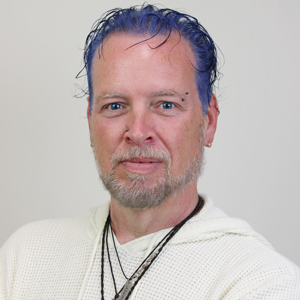MS in Athletic Training
Training to Lead the Future
Antioch University’s Master of Science in Athletic Training (MSAT) program provides a distinctive combination of a strong liberal arts foundation and immersive clinical experience crafted to launch your career in athletic training.
This program delivers the critical skills and expertise needed to tackle health disparities and enhance wellness across diverse communities.
Offering hands-on experience in college, high school, and clinical environments, Antioch University’s MSAT program prepares you to become an influential leader in athletic training, dedicated to improving the lives of active individuals. Start your journey with us and make a lasting impact in the field.
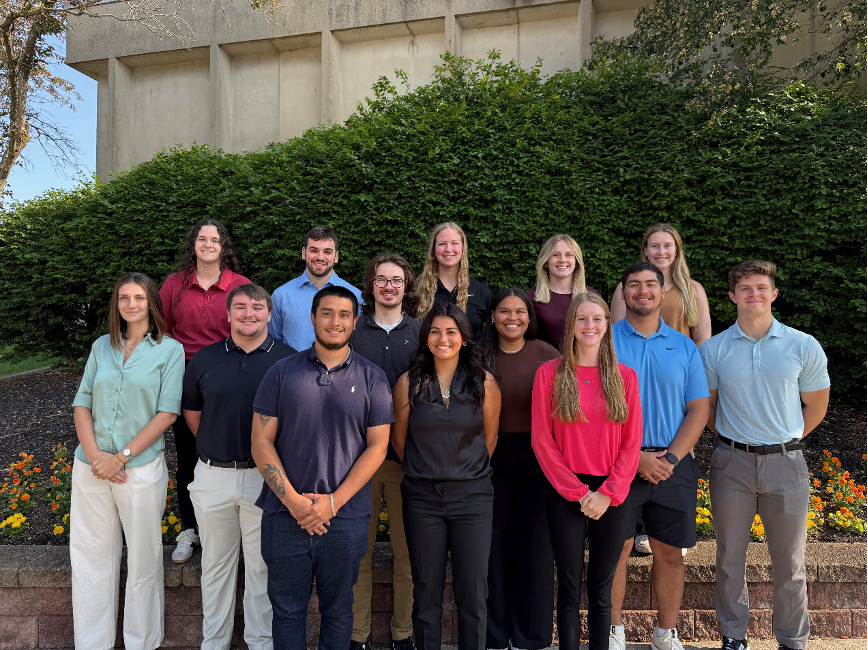
Program Overview
Antioch University’s Master of Science in Athletic Training (MSAT) program prepares students to become skilled, compassionate healthcare professionals who are agents for social justice in diverse clinical settings. Housed within Antioch’s Graduate School of Nursing and Health Professions, the MSAT program is part of the Coalition for the Common Good and is uniquely delivered on campus at Otterbein University in Westerville, Ohio, utilizing state-of-the-art facilities and a hands-on, learner-centered approach.
This full-time, two-year, CAATE-accredited professional program begins each May, with the first month offered entirely online, students transition to in-person classes in June.
The curriculum integrates foundational coursework in anatomy, evaluation, rehabilitation, and general medicine with robust clinical experiences each semester. Students are immersed in varied settings—ranging from high schools to colleges to emerging practice areas like dance medicine and public health—ensuring readiness for BOC certification and diverse careers in athletic training.
Clinical placements include high-impact partnerships:
- Ohio State University Athletics
- OhioHealth (including opportunities with the Columbus Blue Jackets of the NHL and the Columbus Crew of MLS)
- An extensive, multi-tiered collaboration with Otterbein University Athletics provides students with exceptional hands-on experience in NCAA Division III sports medicine.
Antioch's MSAT program emphasizes cultural humility, interprofessional collaboration, evidence-based practice, and social determinants of health as essential components of patient-centered care. Small cohort sizes, individualized mentorship, and a commitment to lifelong learning empower graduates to lead and innovate within the evolving landscape of healthcare.
Join us at Antioch University to advance your career and make a meaningful impact in the lives of athletes and active individuals.
Licensure
This program is designed to lead to state licensure.
Contact the Program
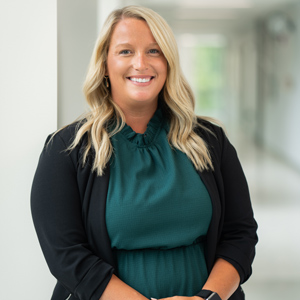
Allison B. Smith, PhD, ATC, LAT
Founding Program Chair, MS Athletic Training
Graduate School of Nursing & Health Professions
Email: [email protected]
Admission Team Contacts
Brett Jones, Admissions Counselor, and Ruth Joseph, Admissions Counselor
- Develop Competent, Skilled, and Thoughtful Evidence-Based Practitioners.
- Equip students with advanced knowledge and clinical skills in athletic training, emphasizing self-reflection on personal values and biases to enhance their practice and promote diversity and inclusion in healthcare.
- Promote Social Justice, Equity, and Community Engagement
- Prepare students to become catalysts for change by integrating principles of social justice into their professional practice, advocating for equitable healthcare access and outcomes, promoting equity, equality, and inclusion, and engaging in community service and outreach programs.
- Foster Collaborative Leadership and Lifelong Learning
- Create a supportive and inclusive learning environment that encourages collaborative engagement among students, faculty, and healthcare professionals while instilling a commitment to continuous professional development and leadership in advancing the field of athletic training and healthcare equity.
Goal 1: Develop Competent, Skilled, and Thoughtful Evidence-Based Practitioners
Student Learning Outcomes with CAATE Standards:
- Demonstrate advanced knowledge and clinical skills in athletic training through evidence-based practice and effective patient care.
- Standard 56: Incorporate evidence-based practice into clinical decision-making.
- Standard 58: Use clinical reasoning and evidence-based practice to provide patient-centered care.
- Exhibit the ability to self-reflect on personal values and biases, showing an understanding of their impact on patient care and professional interactions.
- Standard 66: Engage in reflective practice to enhance professional growth and development.
- Apply inclusive practices that recognize and respect the diversity of patients, ensuring equitable treatment in athletic training settings. Standard 69: Demonstrate cultural competence in the delivery of healthcare.
- Standard 72: Provide care that respects the diversity of patients, including their cultural, socioeconomic, and personal backgrounds.
Goal 2: Promote Social Justice, Equity, and Community Engagement
Student Learning Outcomes:
- Integrate principles of social justice into clinical practice, advocating for policies and practices that promote healthcare equity.
- Standard 75: Advocate for policies and practices that promote health equity and social justice.
- Standard 80: Engage in professional activities that contribute to the advancement of the profession and promote social justice.
- Identify and address health disparities within diverse populations, implementing strategies to improve access to and quality of care. Standard 68: Recognize and address health disparities in diverse populations.
- Standard 70: Develop strategies to reduce health disparities and improve access to care.
- Engage in community service and outreach activities, demonstrating a commitment to improving health and wellness within various communities.
- Standard 77: Participate in community service and outreach programs that promote health and wellness.
Goal 3: Foster Collaborative Leadership and Lifelong Learning
Student Learning Outcomes:
- Exhibit effective leadership and advocacy skills, taking initiative in promoting advancements in the field of athletic training and healthcare.
- Standard 74: Demonstrate leadership skills in the delivery of healthcare.
- Standard 78: Advocate for the profession and for policy changes that improve healthcare delivery and patient outcomes.
- Demonstrate the ability to work collaboratively with interprofessional teams to enhance patient care outcomes. Standard 76: Engage effectively with interprofessional healthcare teams to provide comprehensive patient care.
- Commit to lifelong learning by actively participating in professional development opportunities, staying current with advancements and research in athletic training.
- Standard 63: Engage in continuous professional development and lifelong learning.
- Standard 65: Participate in professional development activities that enhance knowledge and skills.
Accreditation

This program is accredited by the Commission on Accreditation of Athletic Training Education.
Change lives. Start with your own.
Tell us a little about yourself, and an Admissions Counselor will reach out to you to talk through your options:
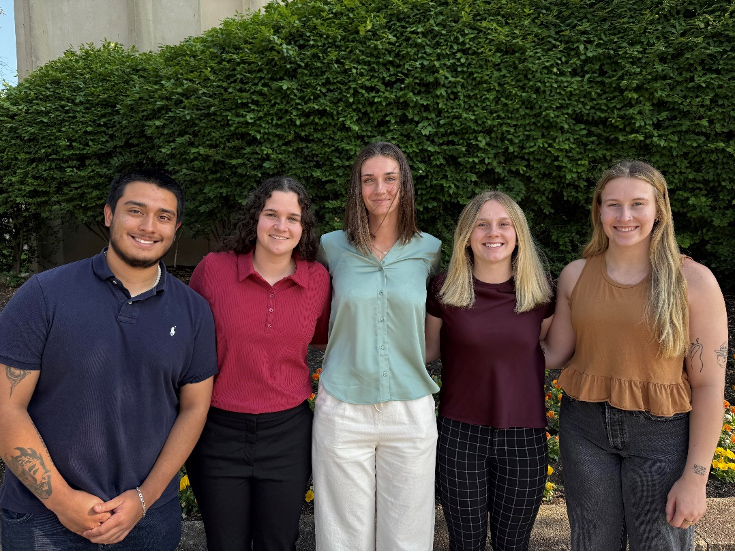

Faculty Spotlight

Paige Ciminello, DAT, ATC
Clinical Education Coordinator

Kalyn Jasinski, DAT, LAT, ATC
Core Faculty
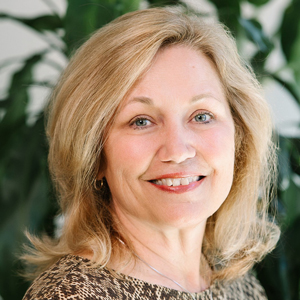
Diane White, PhD, RN
Dean

Allison B. Smith PhD, ATC, LAT
Faculty
Additional Program Details
The Antioch University Master of Science in Athletic Training (MSAT) program offers a unique blend of hands-on clinical experiences, immersive learning, and research opportunities, preparing students to excel as certified athletic trainers. With the partnership of Otterbein University, students gain access to an exceptional network of healthcare professionals and state-of-the-art facilities.
Students participate in four hands-on clinical rotations across diverse settings, such as collegiate athletics, outpatient rehabilitation clinics, high schools, and more. These rotations provide exposure to various athletic training environments, ensuring students develop a well-rounded skill set to meet the demands of different patient populations.
In their final year, students embark on a semester-long immersive clinical experience, where they take on the role of an athletic trainer under the guidance of experienced preceptors. This full-time immersion allows students to refine their clinical skills and gain deeper insight into the day-to-day responsibilities of athletic trainers.
Students will complete a thesis project as a capstone to their degree, showcasing their ability to conduct substantial research in a specific area of interest. Throughout the program, students also have multiple opportunities for publication and presentations, advancing their professional development and contributing to the field of athletic training.
The program includes a cutting-edge biomechanics course that leverages Otterbein’s state-of-the-art biomechanics institute, providing students with advanced tools and technologies to analyze movement and improve patient outcomes.
By enrolling in the Antioch MSAT program, students gain access to the robust Otterbein athletic training alumni and professional network within Central Ohio and beyond. This network provides valuable connections for clinical placements, mentorship, and career opportunities in athletic training and related fields.
56 credit hours; 6 semesters; 2 full calendar years starting in the Summer
- National Athletic Trainers’ Association (NATA)
- Great Lakes Athletic Trainers’ Association (GLATA)
- Ohio Athletic Trainers’ Association (OATA)
- Board of Certification (BOC)
- Journal of Athletic Training
- Athletic Training Education Journal
- Commission on the Accreditation of Athletic Training Education (CAATE)
Frequently Asked Questions
A master’s degree is now the required level of education for becoming a certified Athletic Trainer. Earning a Master of Science in Athletic Training (MSAT) not only prepares you to take the BOC exam but also equips you with advanced clinical skills, critical thinking, and leadership abilities necessary for success in diverse healthcare environments. With an MSAT, you’ll be ready to make an impact in athletic training and sports medicine.
The Commission on Accreditation of Athletic Training Education (CAATE) is the body that accredits Athletic Training programs in the U.S. CAATE accreditation ensures that educational programs meet the highest standards for preparing students to become competent and effective athletic trainers.
The Board of Certification (BOC) is the credentialing agency that certifies Athletic Trainers. To practice as an Athletic Trainer, students must pass the BOC exam, demonstrating their knowledge and skills in athletic training practice
Career Outlook
Athletic trainers are in high demand across settings such as professional sports, colleges, high schools, performing arts companies, the military, clinics, and hospitals. The Bureau of Labor Statistics projects strong job growth in athletic training, driven by rising awareness of sports injuries and increasing emphasis on physical fitness. With an MSAT degree, you’ll step into a leadership role with the skills to make a difference in athletes' lives and beyond.
At Antioch University, athletic training is more than a career—it’s a platform for advancing social justice, inclusive healthcare, and community wellness.
Admission, Tuition, & Financial Aid
Admission Requirements
2026 Application Cycle
To be considered for admission to the Antioch University Master of Science in Athletic Training (MSAT) program, applicants must meet the following requirements:
- Baccalaureate Degree: Completion of a bachelor’s degree from a regionally accredited college or university prior to matriculation.
- Observation Hours: Minimum of 50 hours of observation under the direct supervision of a certified athletic trainer (ATC). Students should complete the hours verification document and submit in their ATCAS application.
- GPA: Minimum cumulative undergraduate GPA of 3.0 on a 4.0 scale.
- GRE Scores: Not required for admission. Optional if the applicant wishes to submit scores.
- Virtual Interview: All qualified applicants will participate in a 15–20 minute virtual interview via Zoom or a similar platform. This provides an opportunity to discuss professional goals, relevant experiences, and alignment with the Antioch MSAT program values.
Applicants must have completed the following college-level prerequisite courses (minimum grade of C) prior to enrollment:
- Biology with Lab
- Chemistry with Lab
- Physics with Lab
- Anatomy & Physiology I and II with Labs
- Exercise Physiology
- Psychology
- Nutrition
- Statistics
Petitions for course substitutions will be reviewed on a case-by-case basis by the Program Director.
Due to the residency and special nature of this program hosted at Otterbein, accepted students may inquire about on or off-campus housing availability. (Refer them to Ally Smith).
A limited number of Graduate Internships or Teaching Assistantships are available through Otterbein University. See Careers at Otterbein for available positions.
How to Apply
All applicants to Antioch University’s Master of Science in Athletic Training (MSAT) program must submit their application through the Athletic Training Centralized Application Service (ATCAS). Required materials—including official transcripts, verification of a minimum of 50 observation hours under a certified athletic trainer (ATC), and other supplemental documents—must be uploaded directly to the ATCAS system. Begin your application at www.atcas.org.
Antioch uses a tiered admissions model based on institutional partnerships:
- Tier 1 (CCG Partner Schools):
Guaranteed admission for students who meet all minimum requirements.
Application deadline: First-priority admissions window: Application deadline is November 15th, and acceptance notification will be issued prior to January 1.
- Tier 2 (Affiliated Institutions):
Guaranteed admission and reserved seats for students who meet requirements.
Priority admissions window: Application deadline is December 1 and acceptance notification by December 15. - Tier 3 (General Applicants):
Open to all other applicants.
Admissions window: Priority Application deadline is February 1; rolling admissions and final review up until March 1 or until seats are filled. - All qualified applicants will also complete a virtual interview as part of the admissions process. Early submission is encouraged to ensure priority review and seat availability.
Application and supplemental materials are due by April 15 each year.
Students must apply through the ATCAS Application.
Tuition and Fees
| Program | Cost | ||
|---|---|---|---|
| Master of Science in Athletic Training | $628 per semester hour (56 hours) | ||
| View the Cost of Attendance Components | |||
| Course | Term | Course Fee | Course Fee Description | |
|---|---|---|---|---|
| ATR 5210: Acute Care and Emergency Response | Summer | $75 | CPR certification Fee, tape supplies, Splinting supplies | |
| ATR 5410: Clinical Experience I: Lower Extremity Evaluation and Evidence Based Practice Skills | Fall | $82 | NATA annual student membership dues | |
| ATR 5301: Applied Therapeutic Interventions Lab | Fall | $60 | modality purchase and maintenance | |
| ATR 5420: Clinical Experience II: Upper Extremity Evaluation and Therapeutic Modalities | Spring | $20 | modality purchase and maintenance | |
| ATR 5501: Biomechanics and Rehabilitation Strategies lab | Spring | $20 | Biomechanical Capture System Markers | |
| ATR 5220: Complex Emergencies and Critical Interventions | Spring | $50 | tape supplies, casting supplies, QPR Suicide training | |
| ATR 5430: Clinical Experience III: General Medicine and Pharmacological Applications | Summer | $100 | stethoscope, Simulation lab supplies ($65) | |
| ATR 6410: Clinical Immersion I: Ethics and Certification Readiness | Fall | $340 | NATA Student Membership ($82), BOC Practice tests with Report ($58), AT Frontier Study Prep ($200) | |
| ATR 6420: Clinical Immersion II: Certification and Professional Practice | Spring | $450 | BOC Application Fee ($75), BOC Exam Fee ($375) | |
| $300 | Annual Program Free ($100 Typhon) ($50 Castle branch) | |||
| $1,497 |
Financial Aid
Many students finance their education through some form of financial aid. You may not be sure which federal, state, public, and private aid packages – such as loans, scholarships, and grants – are right for you. Our staff is here to help you so you can focus on what’s most important: beginning your academic program.
Antioch University is proud to partner with several schools and employers to offer scholarships and/or special educational benefits to employees, students, and alumni of select partner institutions. To learn more about these scholarships and to find out if you are eligible, talk with Admissions.

Start your Antioch Journey
Take your next step - talk to our admissions team to find the right program for you.

